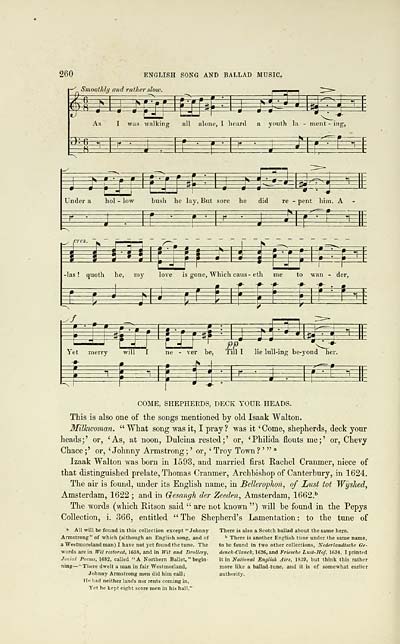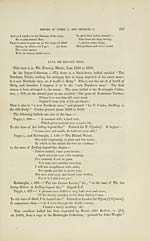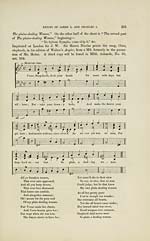Glen Collection of printed music > Printed text > Popular music of the olden time > Volume 1
(294) Page 260 - Come, shepherds, deck your heads
Download files
Complete book:
Individual page:
Thumbnail gallery: Grid view | List view

260 ENGLISH SONG AND BALLAD MUSIC.
Smoothly and rather sloiv.
m
E^
§
^ —
us
^s
As I was walking all alone, I heard a youth la - ment - ing.
iSl
-ttaJzSai
rmzPF^^^
N— E
g
3=
Under a hoi - low bush he lay, But sore he did re - pent him. A
-F -
li
Ul-fTj I Q_^ ^y=^
-las! quoth he, my love is gone, Which caus- eth me to wan - der,
_(■ _t t—^f^ -JT-
P^ ^^
'f
w
3
1
^:
PP
Yet merry will I ne - ver be. Till I lie lull-ing be-yond her.
I
m
COME, SHEPHERDS, DECK YOUR HEADS.
This is also one of the songs mentioned by old Isaak Walton.
Milkwoman, " What song was it, I pray? was it 'Come, shepherds, deck your
heads;' or, 'As, at noon, Duleina rested;' or, 'Philida flouts me;' or. Chevy
Chace ;' or, 'Johnny Armstrong ; ' or, ' Troy To"v\ti ? ' " *
Izaak Walton was born in 1593, and married first Rachel Cranmer, niece of
that distinguished prelate, Thomas Cranmer, Archbishop of Canterbury, in 1624.
The air is found, under its English name, in Bellerophoii, of Lust tot Wyshed^
Amsterdam, 1622 ; and in Gescmgh der Zeeden^ Amsterdam, 1662.**
The words (which Ritson said " are not known ") will be found in the Pepys
Collection, i. 366, entitled " The Shepherd's Lamentation : to the tune of
* All will be found in this collection except "Johnny
Armstrong" of which (although an English song, and of
a Westmoreland man) I have not yet found the tune. The
words are in Wit restored, 1658, and in Wit and Drollery,
Jovial Poems, 1682, called "A Northern Ballet, " begin-
ning— " There dwelt a man in fair Westmorland,
Johnny Armstrong men did him call;
He had neither lands nor rents coming in,
Yet he kept eight score men in his hall."
There is also a Scotch ballad about the same hero.
*• There is another English tune under the same name,
to be found in two other collections, Nederlandtsche Ge-
denck-Clanck, 1626, and Friescke Lusl-Hof, 1634. I printed
it in National English Airs, 1839, but think this rather
more like a ballad-tune, and it is of somewhat earlier
authority.
Smoothly and rather sloiv.
m
E^
§
^ —
us
^s
As I was walking all alone, I heard a youth la - ment - ing.
iSl
-ttaJzSai
rmzPF^^^
N— E
g
3=
Under a hoi - low bush he lay, But sore he did re - pent him. A
-F -
li
Ul-fTj I Q_^ ^y=^
-las! quoth he, my love is gone, Which caus- eth me to wan - der,
_(■ _t t—^f^ -JT-
P^ ^^
'f
w
3
1
^:
PP
Yet merry will I ne - ver be. Till I lie lull-ing be-yond her.
I
m
COME, SHEPHERDS, DECK YOUR HEADS.
This is also one of the songs mentioned by old Isaak Walton.
Milkwoman, " What song was it, I pray? was it 'Come, shepherds, deck your
heads;' or, 'As, at noon, Duleina rested;' or, 'Philida flouts me;' or. Chevy
Chace ;' or, 'Johnny Armstrong ; ' or, ' Troy To"v\ti ? ' " *
Izaak Walton was born in 1593, and married first Rachel Cranmer, niece of
that distinguished prelate, Thomas Cranmer, Archbishop of Canterbury, in 1624.
The air is found, under its English name, in Bellerophoii, of Lust tot Wyshed^
Amsterdam, 1622 ; and in Gescmgh der Zeeden^ Amsterdam, 1662.**
The words (which Ritson said " are not known ") will be found in the Pepys
Collection, i. 366, entitled " The Shepherd's Lamentation : to the tune of
* All will be found in this collection except "Johnny
Armstrong" of which (although an English song, and of
a Westmoreland man) I have not yet found the tune. The
words are in Wit restored, 1658, and in Wit and Drollery,
Jovial Poems, 1682, called "A Northern Ballet, " begin-
ning— " There dwelt a man in fair Westmorland,
Johnny Armstrong men did him call;
He had neither lands nor rents coming in,
Yet he kept eight score men in his hall."
There is also a Scotch ballad about the same hero.
*• There is another English tune under the same name,
to be found in two other collections, Nederlandtsche Ge-
denck-Clanck, 1626, and Friescke Lusl-Hof, 1634. I printed
it in National English Airs, 1839, but think this rather
more like a ballad-tune, and it is of somewhat earlier
authority.
Set display mode to: Large image | Transcription
Images and transcriptions on this page, including medium image downloads, may be used under the Creative Commons Attribution 4.0 International Licence unless otherwise stated. ![]()
| Special collections of printed music > Glen Collection of printed music > Printed text > Popular music of the olden time > Volume 1 > (294) Page 260 - Come, shepherds, deck your heads |
|---|
| Permanent URL | https://digital.nls.uk/91370975 |
|---|
| Shelfmark | Glen.254 |
|---|---|
| Additional NLS resources: | |
| Attribution and copyright: |
|
| Description | Scottish songs and music of the 18th and early 19th centuries, including music for the Highland bagpipe. These are selected items from the collection of John Glen (1833 to 1904). Also includes a few manuscripts, some treatises, and other books on the subject. |
|---|
| Description | The Glen Collection and the Inglis Collection represent mainly 18th and 19th century Scottish music, including Scottish songs. The collections of Berlioz and Verdi collected by bibliographer Cecil Hopkinson contain contemporary and later editions of the works of the two composers Berlioz and Verdi. |
|---|

